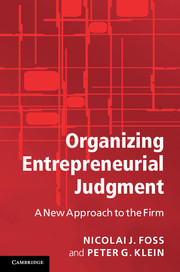Book contents
- Frontmatter
- Contents
- Figures
- Preface
- 1 The need for an entrepreneurial theory of the firm
- 2 What is entrepreneurship?
- 3 Entrepreneurship: from opportunity discovery to judgment
- 4 What is judgment?
- 5 From shmoo to heterogeneous capital
- 6 Entrepreneurship and the economic theory of the firm
- 7 Entrepreneurship and the nature and boundaries of the firm
- 8 Internal organization: original and derived judgment
- 9 Concluding discussion
- References
- Index
9 - Concluding discussion
Published online by Cambridge University Press: 05 June 2012
- Frontmatter
- Contents
- Figures
- Preface
- 1 The need for an entrepreneurial theory of the firm
- 2 What is entrepreneurship?
- 3 Entrepreneurship: from opportunity discovery to judgment
- 4 What is judgment?
- 5 From shmoo to heterogeneous capital
- 6 Entrepreneurship and the economic theory of the firm
- 7 Entrepreneurship and the nature and boundaries of the firm
- 8 Internal organization: original and derived judgment
- 9 Concluding discussion
- References
- Index
Summary
Introduction
The preceding chapters have outlined an entrepreneurial theory of the firm built upon Knightian uncertainty and Austrian capital theory. The theory regards entrepreneurship as an active, owning, controlling agency, the function of assembling, configuring, and reconfiguring bundles of heterogeneous resources under conditions of “true” uncertainty, with strong implications for our understanding of the nature, emergence and boundaries of the firm. It also shows how entrepreneurial judgment about resources is distributed throughout the multi-person firm, as the owner’s original judgment is shared with employees who exercise derived judgment on the owner’s behalf.
This notion of the entrepreneurial firm is implicit in some of the earliest systematic treatments of economic problems, including Cantillon’s (1755) landmark essay, was incorporated by some Classical and Austrian economists, but gradually fell out of favour, losing out to the stylized abstraction of the neoclassical “firm,” a production function that is analytically tractable but descriptively vacuous and silent on the key problems of economic organization and entrepreneurship. The transaction cost, agency-theoretic, property-rights, resource-based, and capabilities theories of the firm that emerged in the 1970s, 1980s, and 1990s breathed new life into the theory of the firm, explicating many important problems of firm behavior and performance, but even these did not bring the entrepreneur back into the story. Likewise, entrepreneurship studies became established as a separate field, focusing on start-ups, small-business management, and innovation, but the entrepreneur remained absent from other, mundane topics in economics and management.
- Type
- Chapter
- Information
- Organizing Entrepreneurial JudgmentA New Approach to the Firm, pp. 221 - 249Publisher: Cambridge University PressPrint publication year: 2012
- 1
- Cited by

